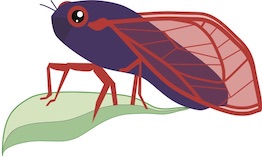

Primitive variables
x :: int, x = 5
d :: double, c :: char, b :: bool
x2 := 5.7 | will be double
(str :: string) = input()
str =! d, c =! b | byte-wise copy
Arrays
A :: [3] double, A[] = 1
remove A[2], A[+3] = 4, A[^5]
A[<3, top>] = A[1]
print(str[<1, 3>], "...")
Structure variables
v :: { (d::double)=3.14, bool, char, string, "const" }
v2 :: v
print(v.d == v2[1]) | 'true'
Sets
s :: { x, x2, { v, 5 } }
sprint(s)
Functions
f1 :: {
toAdd := 2
code
return args[1] + toAdd
}
print(f1(4))
f2 :: { toAdd := 2; return args[1] + toAdd } | same as f1
Classes
C :: {
data :: { int, int, string, char }
fetchData :: { ; return data }
code, data = args | one way to write a constructor
}
Cinstance :: C, Cinstance(2,4,"",'c')
Inheritance
C_child :: C : { data2 :: string }
f3 :: f1 : f2
s2 :: s : { int } | set concatenation
Flow control
if x == x2 then print("eq")
else if x < x2 then ( print("lt"), x2 = x )
else ( ... )
for x in <1, x2> print(x)
while x < x2 do x = that + 1
exit
Cicada-specific
a := @C, sprint(a.data), a =@ * | alias (no pointers in Cicada!)
a2 :: *, a2 = @f1, a2 = @C, a2 = @s | universal alias
v3 :: { toAdd := 2.5 }, (v3 << f1)(4) | code substitution
f4 :: {
params :: { mult::int; mult=2 } | function with optional parameters
code
params(), (params<<args)()
return params.mult*args[1]
}
print(f4(2)), print(f4(2; mult = 3))
remove f4.params, f4#0() | rerun f4's 'constructor'
Run from C
#include <cicada.h>
ccInt myF(argsType args) { ... }
const Cfunction callbackFs[] = { { "myF", &myF } };
int main(int argc, char **argv)
{
runCicada(callbackFs, "$myF(1, 2, 3)", false); // run a script
runCicada(callbackFs, NULL, true); // run interactively
return 0;
}
Cicada is free to use and distribute, under the terms of the MIT License.
Last update: November 3, 2025